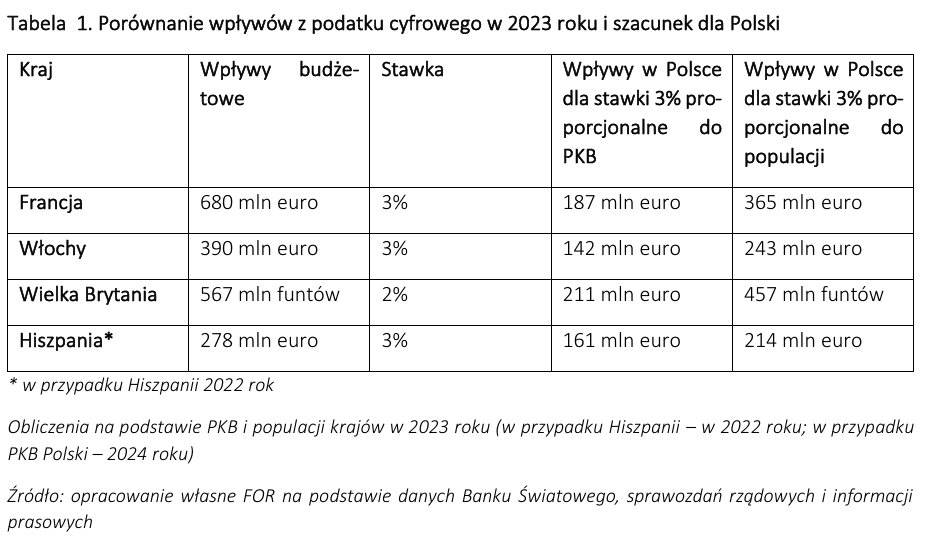A new tax is coming. "The giants will pass it on to consumers anyway"

- Deputy Prime Minister and Minister of Digital Affairs Krzysztof Gawkowski recently announced that Poland will introduce a new tax for digital giants.
- And although it is not yet known what the levy rate would be, according to Gabriel Hawryluk, an analyst at the Civic Development Forum (FOR), the budget would gain no more than PLN 2 billion annually.
- The problem is that in countries where such a levy was introduced, the companies subject to it also increased the prices of services for consumers and entrepreneurs.
- Will the draft law include a provision that would protect Polish consumers from such behavior by big tech companies? We have a response from the Ministry of Digital Affairs.
The Ministry of Digital Affairs is conducting analyses regarding the digital tax model, the CIS has established.
As recently announced by Deputy Prime Minister and Minister of Digital Affairs Krzysztof Gawkowski , this tax would serve to financially support Polish start-ups, the digital-technology sector and the media.
And although – as the Ministry of Digital Affairs points out – at this stage of work no directional decisions have been made as to its shape, alarming voices from experts are already emerging that this levy will not be paid by large corporations, but by ordinary users.
The giants won't pay their dues. Are we expecting a pay raise?According to Gabriel Hawryluk, an analyst at the Civic Development Forum (FOR), in response to the new fiscal burden , technology companies will raise the prices of their services – both directly for consumers and for entrepreneurs.
Such situations have already occurred, for example, in Australia , where after the introduction of a 10% digital tax , Netflix increased the prices of its services by 10% .
In Austria, Canada, Spain, France, the UK, Italy and Turkey – which also introduced a digital tax – Google increased the advertising fee by 2 to 7% in line with the tax amount.

Is the game not worth the candle? The budget will gain no more than 2 billion PLN per year.According to Deloitte's estimates, the 3% tax in France, calculated on revenues, would fall 55% on consumers, 40% on businesses, and only 5% on corporations. Therefore, the cost of the tax may primarily fall on consumers, according to the FOR analysis.
According to Hawryluk, the gamble may not be worth the candle from a state finance perspective either. The maximum tax revenue – according to the FOR analyst's estimates – would be no more than PLN 2 billion annually .
Based on the amount of revenue from this tax in several large Western economies, we estimate that in Poland, at a rate of 3%, it would amount to PLN 0.6 to 0.9 billion (assuming that it would be proportional to the size of the economy), or PLN 0.9 to 2 billion (assuming that it would be proportional to the population), reads the FOR analysis.
The Forum analyst also notes that digital corporations pay varying amounts of taxes in different countries. For example, in 2023, Meta paid 39% of its taxes ($135 billion) in the United States, compared to a total of 23% in Europe and 10% in China.
Globally, the company generated net income of $39 billion, with taxes accounting for 6.2% of its global revenue.
In turn, Facebook Poland reported revenues of over PLN 155 million and a profit of over PLN 34 million in 2023, and paid income tax of almost PLN 9 million . With a profitability of 22%, the income tax paid accounted for 5.2% of the company's generated revenues.
He adds that Facebook Poland's revenues are only 0.03% of Meta's global revenues. Polish Facebook users constitute approximately 0.8% of global users. Poland also accounts for 0.76% of global GDP and 0.46% of the world's population.
Considering Poland's restrictive transfer pricing regulations and OECD guidelines, the tax settlement problem for large international digital companies is more about the lack of reporting revenues in the country, rather than "increasing costs." And this is precisely what the digital tax would compensate for, the analyst believes.
It is worth recalling that in 2021, the OECD reached an agreement on key aspects of reforming the international taxation of multinational enterprises' profits to prevent them from shifting their profits. This initiative involved 140 countries.
This agreement contains solutions that allow, among other things, for the reallocation of taxing rights between jurisdictions where the largest and most profitable multinational groups hold market share and generate profits.
It also introduces a minimum tax for the largest groups of no less than 15% .
"All the companies analyzed generate a smaller percentage of their revenue in Poland than the country's size would suggest . In some cases, the difference is clear. Only in the case of Amazon does the percentage of revenue declared in Poland seem to correspond in any way to the country's size," notes Hawryluk.
He adds that the five technology giants declared a total revenue of just under PLN 9.5 billion (approximately USD 2.25 billion) in Poland in 2023 and paid income tax on it in the amount of over PLN 220 million .
Poland already has its own digital taxHawryluk also emphasizes that forcing giants to pay taxes on revenues generated in Poland may lead to an increase in the prices of digital services, which will be felt by both entrepreneurs and end consumers.
The analyst also reminds that a digital tax has been in force in Poland since 2020 – for now , however, it only applies to streaming services (this refers to VOD, i.e. a fee for access to a service that allows you to watch films, series and other programs at a time convenient for the user, not only during live broadcasts – editor's note) and amounts to 1.5% of revenue from user fees or advertising.
The proceeds from the tax go to the Polish Film Institute and in 2024 amounted to PLN 49 million.
According to Hawryluk, the new levy would, in a sense, be an extension of the concept of this tax to other digital services.
According to Hawryluk, the new tax would also pose sectoral threats and disrupt market balance . For example, the introduction of a banking tax in Poland by the PiS government resulted in, among other things, "very low interest rates on deposits, which hurt Polish savers. The cost of loans also increased," the analyst pointed out.
According to Hawryluk, there are also doubts as to whether the tax revenues will actually support the development of the Polish technology sector.
Ministry: not every tax can be passed on to the consumerIt doesn't seem like the state will be able to support or stimulate the development of the Polish digital and technology sector through subsidies or other forms of market influence. The Deputy Prime Minister's vision boils down to some form of central economic planning, according to the FOR analysis.
We asked the Ministry of Digital Affairs whether, when designing tax regulations, it will take into account the experience of countries that have already introduced a digital tax and protect consumers from potentially passing on all or most of the burden of this levy to them?
In response to our questions, Minister Gawkowski's ministry replied that the digital tax would only affect companies generating very high revenues and that the 55% figure cited by Hawryluk was only a forecast by Deloitte and Taj.
It was prepared at the request of the industry organization CCIA, representing, among others, companies later subject to the digital tax and opposing its introduction. It was not an analysis of the actual effects of the current regulations, but a forecast prepared before the regulations came into force, the Ministry of Digital Affairs emphasizes.
According to the ministry, the experience of other countries shows that " passing the tax costs on to users does not have to be the rule ."
As an example of such a situation, the Ministry of Digital Affairs provides the above-mentioned VOD fee.
"We have observed that not all suppliers decide to increase prices. It largely depends on:
- elasticity of consumer demand for the services of companies subject to the tax,
- competition on the market and the nature of activity in a given area," the ministry lists.
The Ministry also emphasizes that in some areas of the digital economy , business models "are not based on charging consumers, but, for example, on displaying advertisements or trading data."
"In such a case, it will not be possible to pass on the costs of the levy to consumers," it was noted.
Apart from financial consequences, the introduction of a digital tax will also have political consequences.

It is worth recalling here that the introduction of a digital tax by France in 2018 and its subsequent extension to cloud services in 2024, which directly affected Amazon and Microsoft, provoked a strong reaction from President Donald Trump , who considered these taxes discriminatory and threatened that the United States would impose retaliatory tariffs on French goods.
The US also reported the French taxes to the World Trade Organization, claiming they violate fair trade principles , and appealed to the EU Council. Both disputes remained unresolved in those institutions as of the end of June 2025.
wnp.pl



